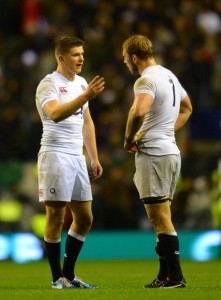
Leadership crisis? Chris Robshaw put in an impressive shift against South Africa, but his late decision cost his team
By Alex Lowe
IN AUSTRALIA they would call it a “brain explosion”. Rotund Australia prop Matt Dunning suffered one in 2003 when he inexplicably used up an advantage by slotting a drop-goal when the NSW Waratahs needed a fourth try to reach the Super 14 semi-finals. Down Under they still refer to Dunning’s as the “ultimate brain explosion”.
Chris Robshaw, unfortunately given the previous 78 minutes of heroic commitment to England’s cause, now stands accused of something similar.
They say international rugby matches are won by inches. They are. The top two inches. Robshaw misread the situation at the end of England’s game against South Africa and afterwards held his hands up to a decision that cost his team one last chance of victory.
There must at least have been an element of Wallaby hangover about Robshaw’s eagerness to go for the posts when England trailed 16-12 with two minutes left, having had his fingers burned against Australia when he turned down shots at goal.
What should be of more concern to Stuart Lancaster was that Robshaw’s authority was so openly questioned. Owen Farrell disagreed with Robshaw’s demand that he kick for the posts, impressing upon his captain the need to go for the corner. Robshaw asked to change his call and was denied. By that time, referee Nigel Owens had pointed to the posts.
Was it insubordination or was it a debate between senior players (Farrell being senior as he was England’s fly-half at the time)? Either way, the team were not unified. Afterwards, Farrell needed a briefing on the party line before explaining what happened to the media.
When asked what decision he would have made if he was captain, Farrell said: “I would back whatever decision Chris made”. Riiiiight.
Of course, there was no guarantee that if England had gone for the corner they would have won the lineout, driven the Springboks backwards and scored the try. Brian Moore and Will Greenwood were among those who backed Robshaw’s decision – but England’s catalogue of errors ultimately condemned it as a poor call.
Farrell ate up valuable seconds by debating the decision and Mouritz Botha then fumbled the restart into touch. Had the Saracens lock let the ball drop out on the full England would have had a scrum on halfway. They were dominant in that area. Who knows what could have happened?
Ultimately, Robshaw’s decision-making in the heat of battle in a Test match is now under the spotlight again, overshadowing his immense individual contribution in the game and the real reason England lost.
England had matched the Springboks’ famed ferocity and tamed their famed scrum. No one would deny England’s warrior spirit or their character as they came back from 16-6 down, with Joe Launchbury and Ben Morgan prominent ball-carriers. It put them in a position to win the game.
But their ability to create an opportunity and take an opportunity in the maelstrom of a Test match keeps costing them dear. They lack a cutting edge and composure. To address the former I’d start Jonathan Joseph against New Zealand, moving Manu Tuilagi to inside-centre. The latter is forged largely through experience.
England cannot afford any more Dunning moments.
Follow Alex Lowe on Twitter @AlexMLowe







